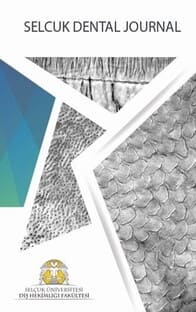Hızlı üst çene genişletmesinin nazofarengeal havayoluna etkisi
Havayolu darlığı, nazal tıkanıklık, palatal genişletme
Effects of rapid maxillary expansion on nasopharyngeal airway
Airway construction, nasal obstruction, palatal expansion,
___
- Aboudara C, Nielsen IB, Huang JC, Maki K, Miller
- by opening the midpalatal suture. Angle Orthod, 3, 201-217.
- Haas AJ, 1980. Long-term posttreatment evaluation of rapid palatal expansion. Angle Orthod, 50, 189– 468-479. 217.
- Handelman CS, Osborne C, 1976. Growth of the
- Treatment Timiing for Rapid Maxillary
- Expansion. Angle Orthod, 71, 343-350.
- nasopharynx and adenoid development from one to
- eighteen years. Angle Orthod, 46, 243-259.
- Baratieri C, Alves M, Gomes de Souza MM, Tirre
- Hershey HG, Stewart BL, Warren DW, 1976. Changes in nasal airway resistance associated with rapid maxillary expansion. Am J of Orthod, 69, 274– 284.
- Langer MR, Itikawa CE, Valera FC, Matsumoto MA, Anselmo-Lima WT, 2011. Does rapid maxillary expansion increase nasopharyngeal space and improve nasal airway resistance?. Int J Pediatr Otorhinolaryngol, 75, 122-125.
- Lessa FCR, Enoki C, Feres MFN, Valera FCP, Lima WTA Matsumoto MA, 2005. Breathing mode influence in craniofacial development. Braz J Otorhinolaryngol, 71, 156-160.
- Lopatiene K, Babarska A, 2002. Malocclusion and upper airway obstruction. Medicina, 38, 277-283.
- Malkoc S, Usumez S, Nur M, Donaghy CE, 2005. Reproducibility of airway dimensions and tongue and hyoid positions on lateral cephalograms. Am J Orthod Dentofacial Orthop, 128, 513-516.
- Oliveira De Felippe NL, Da Silveira AC, Viana G, Kusnoto B, Smith B, Evans CA, 2008. Relationship between rapid maxillary expansion and nasal cavity size and airway resistance: short- and long-term effects. Am J Orthod Dentofacial Orthop, 34, 370- 832.
- Pavlin D, Vukicevik D, 1984. Mechanical reactions of facial skeleton to maxillary expansion determined by laser holography. Am J Orthod, 84, 498-507.
- Sandikçioğlu M, Hazar S, 1997. Skeletal and dental changes after maxillary expansion in the mixed dentition. Am J Orthod Dentofacial Orthop, 111, 321–327
- Sari Z, Uysal T, Üşümez S, Basciftci FA, 2003. Rapid maxillary expansion. Is it better in the mixed or permanent dentition?. Angle Orthod, 73, 654-661.
- Sarver DM, Johnstone MW, 1988. Skeletal changes in vertical and anterior displacement of the maxilla with bonded rapid palatal expansion appliances. Am J Orthod Dentofacial Orthop, 95, 462-466.
- Sökücü O, Doruk C, Uysal OI, 2010. Comparison of the effects of RME and Fan-type RME on nasal airway by using acoustic rhinometry. Angle Orthod, 80, 870-875.
- Tausche E, Luck O, Harzer W, 2004. Prevalence of malocclusions in the early mixed dentition and orthodontic treatment need. Eur J Orthod, 26, 237– 244. 28. Thilander B, Wahlund S, Lennartsson B, 1984. effect of early interceptive treatment in children with posterior cross-bite. Eur J Orthod, 6, 25–34.
- Timms DJ, 1980. A study of basal movement with rapid maxillary expansion. Am J Orthod, 77, 500- 507.
- Timms DJ, 1986. The effect of rapid maxillary expansion on nasal airway resistance. British J of Orthod, 13, 221–228.
- Timms DJ, 1987. Rapid maxillary expansion in the treatment of nasal obstruction and respiratory disease. Ear Nose Throat J, 66, 242-7.
- Usumez M, Uzel I, 2008. Evaluation of rapid maxillary expansion and quad-helix in the late mixed dentition period. Turkish J of Orthod, 21, 187–195
- Velázquez P, Benito E, Bravo LA, 1996. Rapid maxillary expansion. A study of the long-term effects. Am J Orthod Dentofacial Orthop, 109, 361-367.
- Warren DW, Hershey GH, Turvey TA, Hinton VA, Hairfield WM, 1987. The nasal airway following maxillary expansion. AmJ Orthod Dentofacial Orthop, 91, 111–116.
- Warren DW, Hairfield WM, Seaton D, Morr KE, Smith LR, 1988. The relationship between nasal airway size and nasal-oral breathing. Am J Orthod Dentofacial Orthop, 93, 289–293.
- Wertz RA, 1968. Changes in nasal airflow incident to rapid maxillary expansion. Angle Orthod, 38, 1–11.
- Wertz RA, 1970. Skeletal and dental changes accompanying rapid midpalatal suture opening. Am J of Orthod, 58, 41–66.
- ISSN: 2148-7529
- Yayın Aralığı: Yılda 3 Sayı
- Başlangıç: 2014
- Yayıncı: Selcuk Universitesi Dişhekimliği Fakültesi
Hızlı üst çene genişletmesinin nazofarengeal havayoluna etkisi
MEHMET AKIN, Emire Aybüke ERDUR, Ayşe MENZEK, ÖMER ERDUR
İZOLE OLİGODONTİ: OLGU SUNUMU VE İKİ YILLIK TAKİP
Yasim YILDIRIM, Murat Selim BOTSALI, Yağmur ŞENER, Emre KORKUT
Yeni doğan dudak damak yarıklı bebeklerin alçı modellerinin değerlendirilmesi
MERVE GÖYMEN, Eren İŞMAN, RIDVAN OKŞAYAN, Tolga TOPCUOĞLU
İzole oligodonti: Olgu sunumu ve iki yıllık takip
Yasin YILDIRIM, Murat Selim BOTSALI, Yağmur ŞENER, EMRE KORKUT
Birinci büyük azı dişlerde çürük gelişme riskinde sabit ortodontik tedavinin etkisi
SAİD KARABEKİROĞLU, ZEHRA İLERİ, Mehmet Emre YILMAZ, NİMET ÜNLÜ
Süt dişleriyle ilişkili kompound odontoma: İki olgu
EBRU KÜÇÜKYILMAZ, Selçuk SAVAŞ, Abdullah KALAYCI, Sibel YILDIRIM
